Organism vs. Cell — What's the Difference?
Edited by Tayyaba Rehman — By Urooj Arif — Updated on April 4, 2024
An organism is a living entity capable of functions like growth and reproduction, whereas a cell is the basic unit of life in organisms.

Difference Between Organism and Cell
Table of Contents
ADVERTISEMENT
Key Differences
While an organism represents a complete living system capable of independent existence, a cell is a building block of such systems. In multicellular organisms, such as animals and plants, cells organize into tissues, which then form organs, and these organs work together in organ systems to support the life of the organism. This hierarchical organization illustrates the complexity and coordination needed to maintain life at different scales.
The relationship between organisms and cells is inherently hierarchical. A single cell can be an organism if it exhibits all characteristics of life independently, as seen in unicellular organisms like amoebas and bacteria. In contrast, multicellular organisms rely on the collective operation of numerous cells, each with its specific role, to sustain life.
In terms of scientific study, organisms and cells offer different perspectives on life. Research on organisms can provide insights into ecology, evolution, and behavior, focusing on how life adapts and interacts within various environments. Cell research, however, delves into the molecular and biochemical processes that underlie life's basic functions, such as DNA replication, energy production, and cellular communication. Both levels of organization are crucial for understanding the breadth and depth of biological sciences.
Comparison Chart
Definition
A living entity capable of life functions
The basic structural, functional, and biological unit of all living organisms
Complexity
Can be single-celled or multicellular
Single unit, can be part of multicellular structures
ADVERTISEMENT
Functionality
Performs life processes independently or through a system of cells
Performs essential life processes, may specialize in multicellular organisms
Organization Level
Entire living system
Building block of life
Example
Humans, trees, bacteria
Human skin cells, neurons, bacterial cells
Compare with Definitions
Organism
Investigated in biology for their behaviors, interactions, and evolution.
Ecologists study how organisms interact with each other and their environment.
Cell
Research on cells contributes to understanding diseases, genetics, and cellular processes.
Studying cancer cells helps researchers understand how tumors grow and spread.
Organism
Ranges from single-celled to highly complex multicellular entities.
A human is a complex organism composed of trillions of cells.
Cell
Present in all living organisms, from the simplest to the most complex.
Even in complex organisms like humans, individual cells carry out basic life functions.
Organism
Multicellular organisms have a hierarchical structure of cells, tissues, and organs.
In organisms like plants, specialized cells form tissues, which make up organs such as leaves and roots.
Cell
Varies in type and function, from nerve cells to skin cells.
Nerve cells (neurons) transmit signals across long distances within the body.
Organism
Capable of independent life processes.
A single-celled organism like an amoeba lives and reproduces on its own.
Cell
The smallest unit that can perform all life processes.
Bacterial cells are simple, single-celled organisms.
Organism
Exhibits a vast range of forms and functions in the natural world.
Organisms include bacteria, fungi, plants, and animals, each adapted to specific environments.
Cell
Can specialize to perform specific functions in multicellular organisms.
Red blood cells transport oxygen throughout the body.
Organism
In biology, an organism (from Greek: ὀργανισμός, organismos) is any organic, living system that functions as an individual entity. All organisms are composed of cells (cell theory).
Cell
A narrow confining room, as in a prison or convent.
Organism
An individual form of life, such as a bacterium, protist, fungus, plant, or animal, composed of a single cell or a complex of cells in which organelles or organs work together to carry out the various processes of life.
Cell
A small enclosed cavity or space, such as a compartment in a honeycomb or within a plant ovary or an area bordered by veins in an insect's wing.
Organism
A system regarded as analogous in its structure or functions to a living body
The social organism.
Cell
(Biology) The smallest structural unit of an organism that is capable of independent functioning, consisting of cytoplasm, usually one nucleus, and various other organelles, all surrounded by a semipermeable cell membrane.
Organism
The fact of being organic; organicity.
Cell
(Architecture) See web.
Organism
Something with many separate interdependent parts, seen as being like a living thing; an organic system.
Cell
The smallest organizational unit of a clandestine group or movement, such as a banned political movement or a terrorist group. A cell's leader is often the only person who knows members of the organization outside the cell.
Organism
(biology) A discrete and complete living thing, such as animal, plant, fungus or microorganism.
Cell
A single unit for electrolysis or conversion of chemical into electric energy, usually consisting of a container with electrodes and an electrolyte; a battery. Also called electrochemical cell.
Organism
Organic structure; organization.
Cell
A single unit that converts radiant energy into electric energy
A solar cell.
Organism
An organized being; a living body, either vegetable or animal, composed of different organs or parts with functions which are separate, but mutually dependent, and essential to the life of the individual.
Cell
A fuel cell.
Organism
A living thing that has (or can develop) the ability to act or function independently
Cell
A geographic area or zone surrounding a transmitter in a cellular telephone system.
Organism
A system considered analogous in structure or function to a living body;
The social organism
Cell
A cellphone.
Cell
(Computers) A basic unit of storage in a computer memory that can hold one unit of information, such as a character or word.
Cell
A storm cell.
Cell
A small humble abode, such as a hermit's cave or hut.
Cell
A small religious house dependent on a larger one, such as a priory within an abbey.
Cell
A box or other unit on a spreadsheet or similar array at the intersection of a column and a row.
Cell
To store in a honeycomb.
Cell
To live in or share a prison cell.
Cell
A single-room dwelling for a hermit.
Cell
A small monastery or nunnery dependent on a larger religious establishment.
Cell
A small room in a monastery or nunnery accommodating one person.
Gregor Mendel must have spent a good amount of time outside of his cell.
Cell
A room in a prison or jail for one or more inmates.
The combatants spent the night in separate cells.
Cell
Each of the small hexagonal compartments in a honeycomb.
Cell
Any of various chambers in a tissue or organism having specific functions.
Cell
(entomology) The discal cell of the wing of a lepidopteran insect.
Cell
(obsolete) Specifically, any of the supposed compartments of the brain, formerly thought to be the source of specific mental capacities, knowledge, or memories.
Cell
A section or compartment of a larger structure.
Cell
Any small dwelling; a remote nook, a den.
Cell
A device which stores electrical power; used either singly or together in batteries; the basic unit of a battery.
This MP3 player runs on 2 AAA cells.
Cell
(biology) The basic unit of a living organism, consisting of a quantity of protoplasm surrounded by a cell membrane, which is able to synthesize proteins and replicate itself.
Cell
(meteorology) A small thunderstorm, caused by convection, that forms ahead of a storm front.
There is a powerful storm cell headed our way.
Cell
(computing) The minimal unit of a cellular automaton that can change state and has an associated behavior.
The upper right cell always starts with the color green.
Cell
(card games) In FreeCell-type games, a space where one card can be placed.
Cell
A small group of people forming part of a larger organization, often an outlawed one.
Those three fellows are the local cell of that organization.
Cell
(communication) A short, fixed-length packet, as in asynchronous transfer mode.
Virtual Channel number 5 received 170 cells.
Cell
(communication) A region of radio reception that is a part of a larger radio network.
I get good reception in my home because it is near a cell tower.
Cell
(geometry) A three-dimensional facet of a polytope. Category:en:Higher-dimensional geometry
Cell
(statistics) The unit in a statistical array (a spreadsheet, for example) where a row and a column intersect.
Cell
(architecture) The space between the ribs of a vaulted roof.
Cell
(architecture) A cella.
Cell
(entomology) An area of an insect wing bounded by veins.
Cell
A cellular phone.
Cell
(transitive) To place or enclose in a cell.
Cell
A very small and close apartment, as in a prison or in a monastery or convent; the hut of a hermit.
The heroic confessor in his cell.
Cell
A small religious house attached to a monastery or convent.
Cell
Any small cavity, or hollow place.
Cell
The space between the ribs of a vaulted roof.
Cell
A jar of vessel, or a division of a compound vessel, for holding the exciting fluid of a battery.
Cell
One of the minute elementary structures, of which the greater part of the various tissues and organs of animals and plants are composed.
Cell
To place or inclose in a cell.
Cell
Any small compartment;
The cells of a honeycomb
Cell
(biology) the basic structural and functional unit of all organisms; cells may exist as independent units of life (as in monads) or may form colonies or tissues as in higher plants and animals
Cell
A device that delivers an electric current as the result of a chemical reaction
Cell
A small unit serving as part of or as the nucleus of a larger political movement
Cell
A hand-held mobile radiotelephone for use in an area divided into small sections (cells), each with its own short-range transmitter/receiver
Cell
Small room is which a monk or nun lives
Cell
A room where a prisoner is kept
Common Curiosities
Can a cell exist independently as an organism?
Yes, single-celled organisms like bacteria function independently as both a cell and an organism.
Why is it important to study both organisms and cells?
Studying both provides a comprehensive understanding of life, from basic cellular functions to complex organismal interactions.
What distinguishes an organism from a cell?
An organism is a complete living system, while a cell is the basic unit of life that constitutes organisms.
What role do cells play in the hierarchy of biological organization?
Cells are the foundational level of biological organization, upon which tissues, organs, and ultimately, organisms are built.
Can organisms be made of a single cell?
Yes, single-celled organisms are complete entities capable of performing all necessary life processes.
How do cells in multicellular organisms differ from single-celled organisms?
Cells in multicellular organisms often specialize for specific tasks, whereas single-celled organisms carry out all life processes within one cell.
How does the complexity of an organism affect its cellular structure?
More complex organisms typically have a greater variety of specialized cells to support diverse functions.
How do cells contribute to the life of multicellular organisms?
In multicellular organisms, cells specialize and work together to perform complex life processes.
What is cell specialization, and why is it important?
Cell specialization allows for the division of labor within multicellular organisms, enhancing efficiency and survival.
How do organisms and cells interact with their environment?
Organisms interact with their environment at a macro level, while cells respond to molecular and chemical cues in their microenvironment.
What impact do cellular processes have on the health of an organism?
Cellular processes are fundamental to an organism's health, as they include vital functions such as energy production, waste removal, and reproduction.
Why are viruses not considered living organisms or cells?
Viruses lack the cellular structure and cannot perform life processes independently, requiring a host cell to replicate.
What are some examples of cell specialization in multicellular organisms?
Examples include muscle cells for movement, nerve cells for signal transmission, and blood cells for transporting oxygen.
How has the study of cells contributed to medical advancements?
Cellular research has led to breakthroughs in understanding diseases, developing treatments, and advancing techniques like gene therapy.
Share Your Discovery

Previous Comparison
Lendee vs. Lender
Next Comparison
Oriented vs. OrientatedAuthor Spotlight
Written by
Urooj ArifUrooj is a skilled content writer at Ask Difference, known for her exceptional ability to simplify complex topics into engaging and informative content. With a passion for research and a flair for clear, concise writing, she consistently delivers articles that resonate with our diverse audience.
Edited by
Tayyaba RehmanTayyaba Rehman is a distinguished writer, currently serving as a primary contributor to askdifference.com. As a researcher in semantics and etymology, Tayyaba's passion for the complexity of languages and their distinctions has found a perfect home on the platform. Tayyaba delves into the intricacies of language, distinguishing between commonly confused words and phrases, thereby providing clarity for readers worldwide.














































